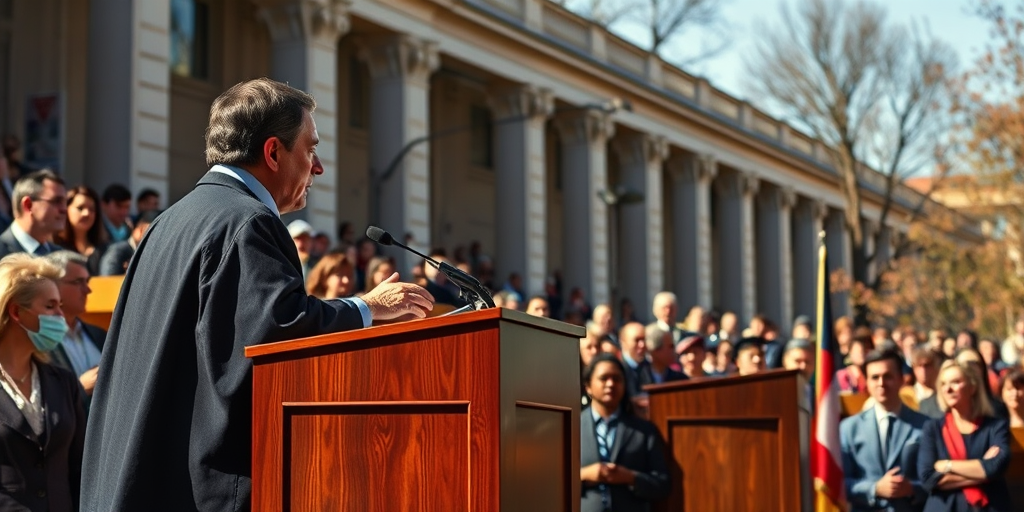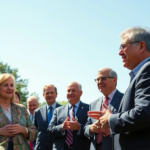Interim President Wayne Frederick’s Harvard Lectures Illuminate Health Leadership and Cancer Disparities
In a significant academic engagement, Howard University’s Interim President, Wayne A. I. Frederick, addressed the Harvard University community in October 2025 with two compelling lectures that underscored the critical nexus between health leadership and cancer disparities. During the S. Lawrence and Judith Schlager Family Lectureship in Surgical Oncology, Frederick presented “Equity Through Empathy: The Human Side of Health Leadership,” and “Trends in Cancer Disparities: New Challenges and Opportunities.”
A Call for Empathetic Leadership
Frederick’s remarks at Harvard struck at the heart of contemporary health care challenges, emphasizing empathy not as a peripheral sentiment but as an essential strategic capability that fortifies trust, inspires innovation, and drives equity in health systems. Frederick advocated for the institutionalization of empathy in health practices, from hiring and training processes to patient care protocols, arguing that empathy directly informs the quality of care and the resilience of health institutions.
“Empathy is the currency of equity,” Frederick stated, encouraging health leaders to cultivate an environment where listening deeply, aligning goals with community needs, and embedding empathy into daily practices become standard. This, he posited, not only improves care but also dismantles systemic inequities.
Historical Context and Contemporary Challenges
Frederick’s lectures provided a historical lens on health inequities, drawing connections between the legacy of the 1910 Flexner Report and today’s challenges. The Flexner Report, while establishing a rigorous standard for medical education, also led to the closure of numerous Black and women’s medical schools, thus constricting opportunities and exacerbating disparities. Frederick challenged contemporary leaders to learn from this history by fostering mentorship, broadening access, and creating systems that dismantle, rather than reinforce, barriers.
“The task before us is to ensure that the systems in place promote inclusivity and equal opportunity,” Frederick emphasized, referencing Howard University’s longstanding commitment to producing clinicians and leaders who marry scientific excellence with human-centered care.
Addressing Cancer Inequities
Turning to the current landscape of cancer epidemiology, Frederick highlighted stark disparities, including a 40% higher mortality rate from breast cancer among Black women compared to their white counterparts, as well as elevated cancer incidence rates among Black men. He pointed out that financial constraints and systemic biases continue to hinder timely and effective care.
Frederick advocated for a multi-pronged response, involving policy reforms, advocacy, and the adoption of patient-centered practices to close these gaps. He noted state-level laws eliminating out-of-pocket expenses for crucial screenings as a step in the right direction, demonstrating how collaborative efforts in policy and research can simultaneously address disparities and improve survival rates.
Local Impact and Community Empowerment
In addition to the national implications, Frederick’s lectures hold particular relevance for communities like those served by Woke News. The themes resonate deeply with local efforts aimed at overcoming health disparities that plague various demographics within the United States.
“Frederick’s talks inspire us to rethink how we support our local healthcare systems,” stated Karen Mitchell, a community health advocate in the area. “By integrating empathy and focusing on equity, we can start to see real transformation in how care is delivered right here at home.”
Historical Connections and Future Prospects
Local residents keenly aware of the historical underpinnings of health inequities can view Frederick’s lectures as a clarion call for systemic change. His emphasis on historical lessons parallels ongoing efforts within the community to address similar disparities, offering a roadmap for future initiatives.
The potential for progress is immense, yet it requires sustained investment and collaboration. Frederick’s insights are not just academic; they present actionable strategies that could redefine how success is measured within health systems, transitioning from metrics focused solely on procedures to those focused on barrier removal and trust-building.
Future Implications and Local Resources
Looking forward, Frederick’s advocacy for empathy-driven health leadership could catalyze further reforms, both locally and nationally. If embraced broadly, these principles could establish a framework where excellence in healthcare is inseparable from equity, providing a more just and effective system for all residents.
For those interested in further exploring these ideas or seeking ways to engage with efforts addressing local health disparities, community forums and partnerships with local health agencies could provide valuable avenues for involvement.
As Frederick concluded in his lectures, “True moral leadership touches hearts, builds trust, and inspires others to imagine and create a better future.” These principles he championed at Harvard could indeed serve as a guiding light for health systems aiming to transform through empathy and equity, marking a new chapter in the ongoing struggle for justice in healthcare.







